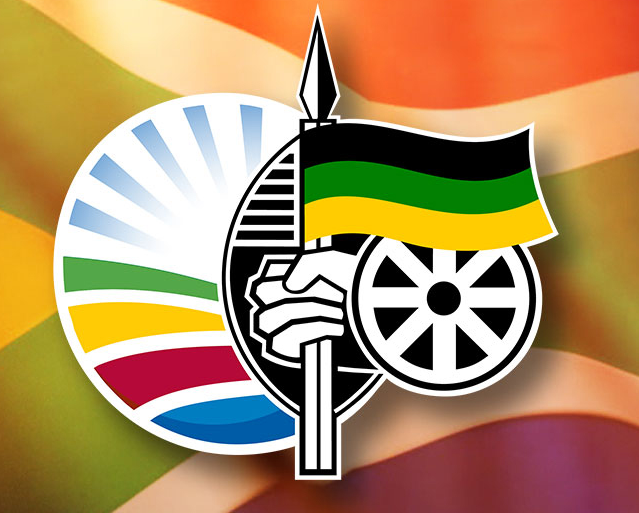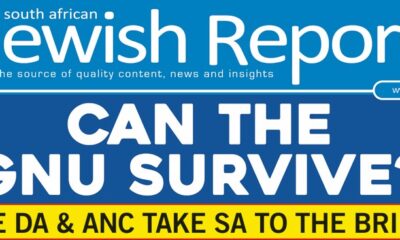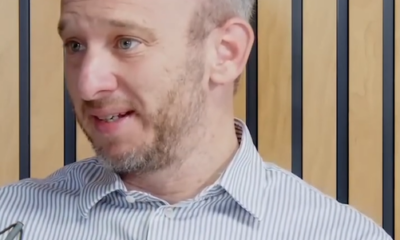
OpEds

Endangered GNU the tip of the iceberg
Sigmund Freud created the psychoanalytic theory of a “screen memory”. By this he meant a seemingly innocuous childhood memory that unconsciously serves to mask or hide a more significant, even traumatic, memory from view.
The current Budget standoff which threatens the end of the African National Congress/Democratic Alliance coalition at the heart of the Government of National Unity (GNU) has been presented by some commentators, either lazily or maliciously, as consequent to either DA overreach in its demands – “arrogance” is the preferred put down here – or about a squabble over a 0.5% hike in the VAT rate and other indirect tax increases. It’s also seen as a bust up between the two major parties in the coalition.
There are some realities in all the above, though on closer examination, these are more Freudian “screen reasons” which hide more fundamental and harsher truths.
Before headlining some key takeaways here, there’s no resolution of this impasse at the time of writing.
Since I was one of the political midwives involved last year in the messy birth of the GNU, I’m not a dispassionate bystander as we watch its possible end, just nine months into its life, or more optimistically, its reformation.
Whatever the immediate outcome, though, the editor of the Sunday Times revealed an important truth behind current ructions.
On Sunday, Makhudu Sefara wrote, “[The ANC NEC meeting to decide the fate of DA in government] is not about whether the DA keeps its positions within the GNU, it’s about how much grip Ramaphosa has lost within the ANC.”
On his accurate telling, the DA/ANC spat is the screen memory; the real fight is within the ANC as to who emerges as Ramaphosa’s successor. The vultures and state looters are lined up behind his deputy, Paul Mashatile, who on past form might render the Zuma state capture years a fond memory.
Then there was the insightful article by Tim Cohen, writing in Currency. He notes “an uncomfortable truth” at the heart of current crisis, describing as false that somehow, the DA was demanding a list of non-obtainable concessions in exchange for its vote on the Budget. Rather, it was the ANC which “does not want its boondoggles [massive wasteful spending on cadres and state agencies] by DA demand for a review of state spending and a say in policy and actions relating to the economy”.
The ANC treats its governing partners with contempt. It’s chaotic, bad faith, and self (or party) serving style of doing things will, if unchecked, also kill off any prospects for economic growth and denting the mountain of unemployment which disfigures our national landscape. It threatens to tip over into an avalanche of future discord and destruction.
It wasn’t serious, for example, for Finance Minister Enoch Godongwana to present two – thus far – versions of the 2025/2026 Budget absent any agreement, let alone engaged negotiations, with his partners in the GNU.
It wasn’t serious, at least in terms of honouring the commitments signed into an agreement embedded in the 14 June 2024 statement of intent, to bypass the signatories to that agreement, i.e. members of the current government. And then go shopping around Parliament for support from parties outside the agreement. This being the precise route followed by the ANC since its first, failed attempt to introduce the Budget on 19 February.
Never mind treating the country of South Africa like an unruly ANC branch, this manoeuvre of going outside government and its partners to shore up support from parties in opposition to the GNU was a spectacular and egregious double-cross. In and of itself, it renders the GNU’s viability in the gravest doubt.
The ANC considered it even less serious in terms of Cabinet management, though it was very serious for the economy, to reintroduce a slightly amended Budget on 12 March, again absent buy-in from key coalition partners.
The DA proposals themselves include sharing in the economic direction and policy of government, spending reviews, devolution of ports and rail, co-chairing of Operation Vulindlela, tweaks on VAT, and so on. These are hardly ideological demands. The DA didn’t call for an end to Black Economic Empowerment or a reconfigured foreign policy or other items which are anathema to the ANC, which would, however, provide a genuine growth spurt for the country.
Had the ANC honoured the provisions of the June 2024 statement of intent which it signed, it would have avoided entirely the fiasco of the last-minute wrangling which has played out in recent weeks.
For example, clause 13 of that agreement bound parties following the formation of the GNU to convene a “lekgotla [strategy session] to develop an agreed policy agenda, which shall include policy priorities for the GNU”.
No such lekgotla has ever been held. Presumably if it had been, the parties might have achieved common agreement on this Budget and its implications.
Still, if you do a vox populi, it’s likely that most people will favour the DA’s continuance in the GNU, especially if its departure heralds the entrance, directly or indirectly, of the Economic Freedom Fighters into governing arrangements.
We don’t at this writing know the outcome of this wrangle and who will be left standing inside or outside government when the Budget finally passes.
There are hard deadlines for the passage, in stages, of the 2025/2026 Budget. The Budget saga isn’t over, and despite the lack of good faith, probably a GNU absent the DA could be a whole lot worse.
Simultaneously, there’s Donald Trump’s liberation day. He unleashed protectionist tariffs on the world and a 30% surcharge on South African exports to the United States (bar minerals), effectively overriding any protection offered by the African Growth and Opportunity Act. And that’s just for starters. Even if it crashes our local industries.
When South Africa was hit by Trump tariffs, it wasn’t because we were being singled out for attention. Tariffs were levied on all countries running trade surpluses with the United States.
However, there’s another set of punishments which Trump could line up against South Africa as he targets us for exemplary attention. We got a foretaste of this with his 7 February executive order addressing “egregious actions” of the South African government.
Right or wrong, things could soon get a whole lot worse. Some useful thoughts on how matters could spiral was spelt out last week by historian and writer, Jonny Steinberg. He wrote, “Could Trump threaten to destroy [SA] with a couple of executive orders and then invite its president to talk? The answer is yes. Trump could impose trade sanctions on SA; he could prohibit US institutions from buying SA’s sovereign debt. He doesn’t need legislation to do this. He could do unthinkable damage to SA by signing his name.”
Saving the current GNU, which means maintaining the partnership with the DA, might, beyond salvaging the Budget and maintaining stability, have the add-on effect of saving SA from further punishing measures from a vengeful Trump. That’s not certain, but it offers at least a measure of hope.
The entrance into the GNU of the “Kill the Boer” red berets, either as a formal member or outside the GNU but with a veto on Budgets and legislation, will extinguish this.
The ball, as the cliché has it, is in the ANC’s court.
- Tony Leon is the founding leader of the Democratic Alliance, the longest serving leader of the official opposition in Parliament since the advent of democracy, and a former ambassador. He is chairperson of a communications company.











Gary Selikow
April 10, 2025 at 2:51 pm
Tony Leon lacks vision, He really does not see the need for Black leadership in the DA. He thinks the one disappointing election cycle of 2019 justifies the party completely turning their back on Black leadership. He is content for DA to be a party of minorities instead of playing to win!
Mark Alcock
April 10, 2025 at 3:04 pm
Such articulated writing skills bring new life to the weary status quo.
Skill twisted in figures of speech is both artful and talent full which are hallmarks commanding the english language with aplomb .Such good news that English can still be written in a style of his own .Indeed of extraordinary exception and high standard that rise above question and leave one in another zone … filled with old and new ideas of depression but also the author still manages to capture and leave us with hope and inspiration.
However , because of so many known and unknown facts ,that the author draws and weaves in to support his narrative, makes the narrative a slow read to capture its every message. To try to speed read the narrative only ends up in another speed crash ,smashing into the next sentence without having caught the last manifold multi layerd message filled with hindsight , insight and political might.
By a fond perennial fan and ex-school class mate since Chelmsford pre-primary school in the early 60’s.